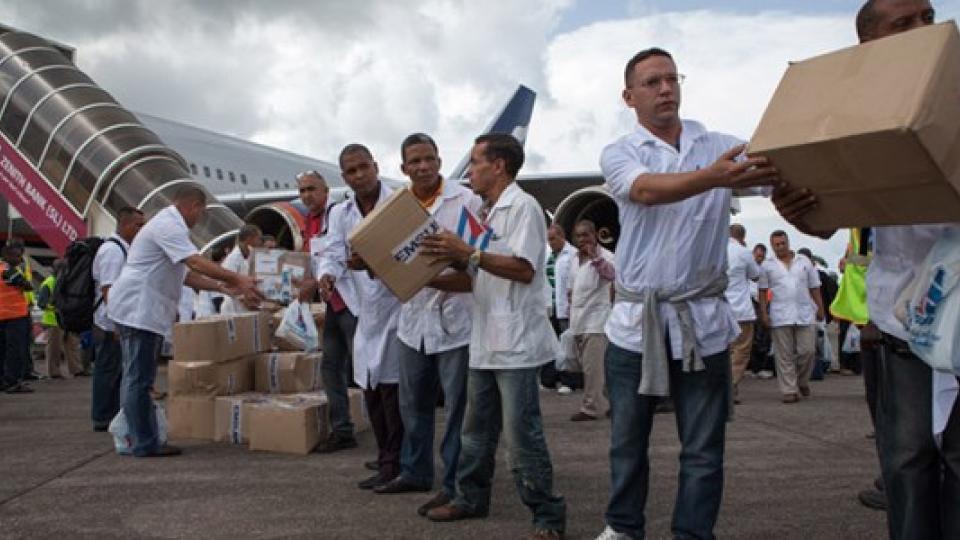Ebola crisis: How Cuba shames the West

The ebola outbreak in West Africa is "unquestionably the most severe acute public health emergency in modern times", World Health Organisation (WHO) director general Dr Margaret Chan said on October 14.
No vaccines exist to fight the disease because it has been largely confined to poor African countries. Chan said: “A profit-driven pharmaceutical industry had no incentive to make products for countries that could not pay,” the Sydney Morning Herald reported.
Figures released by WHO on October 11 revealed that more than 4000 people have died from the ebola virus since the beginning of the outbreak in March. Most of those were infected in Guinea, Liberia and Sierra Leone.
Bruce Aylward, the WHO assistant director-general in charge of the organisation’s response to the epidemic, said: “The ebola virus is killing 70% of the people who contract the disease, and as many as 10,000 new cases a week could be reported by early December,” the Wall Street Journal reported on October 14.
Agencies from the WHO, the African Union, Red Cross, the Australian Medical Association, Save the Children and Medicins Sans Frontieres, have called for the Australian government to send medical personnel and supplies.
But Prime Minister Tony Abbott said on October 12: “We aren't going to send Australian doctors and nurses into harm's way without being absolutely confident that all of the risks are being properly managed. At the moment, we cannot be confident that that is the case. That's why there are no plans to send Australian doctors and nurses, to order Australian doctors and nurses to go to West Africa.”
While committing $18 million, the refusal by the Australian government to send skilled personnel flies in the face of the need for a large boost in medical staff to deal with the crisis.
“Money and materials are important, but those two things alone cannot stop ebola virus transmission,” Chan said last month.
“Human resources are clearly our most important need. We need most especially compassionate doctors and nurses, who will know how to comfort patients despite the barriers of wearing personal protective equipment and working under very demanding conditions.”
A commitment of 250 medical personnel by the Australian government would just compensate for the numbers of medical staff who have already died while caring for those afflicted.
More than 113 Australian health professionals have signed a letter to Abbott asking the government to take further action.
CEO of the Public Health Association of Australia, Adjunct Professor Michael Moore, said in the letter: “One main concern is the epidemic has escalated exponentially since July, and health systems in affected countries are collapsing as a result.
“Only about 10-20% of Ebola patients are receiving care in treatment centres, which means infection is uncontrolled in communities. It is estimated that at least 70% of patients need to be in treatment centres to control the epidemic. This requires skilled personnel who can build hospitals, deliver care, provide security and manage the required logistics.”
The letter urges the government to deploy the Australian Medical Assistance Team, assemble and support appropriately qualified health and other civilians who are ready and waiting to help, and make a significant financial contribution.
The international aid effort to date has been slow and insufficient to contain, let alone reverse or eliminate the virus.
Cuba, a country of just 11 million people, has stood out by making the largest contribution to curb the outbreak in West Africa. It has sent 460 medical personnel to the region.
The first team of 165 people arrived in Sierra Leone in early October and consisted of 100 nurses, 50 doctors, three epidemiologists, three intensive care specialists, three infection control specialist nurses and five social mobilisation officers. They will stay there for six months, working in shifts in smaller teams in ebola treatment centres and community clinics.
A further 296 nurses and doctors will travel to Liberia and Guinea.
Aylward said: “Those of us who have been working on the response efforts at WHO know how truly valuable this offer is. Many countries have offered money but no other country has offered such a large number of workers to go in and help do the most difficult jobs in this crisis.”
That a small country like Cuba is contributing the most says a lot about the hesitance of much larger countries, but it also says a lot about the way Cuba advocates for the right of people everywhere to have access to proper health care.
Cuba has one of the best health systems in the world. There is one doctor for every 137 people and health care is free. As a result, the nation’s life expectancy is one of the highest in the world.
Since its socialist revolution in 1959, medical care has been considered an important tool of solidarity to people beyond Cuba’s borders. More than 50,000 Cuban-trained health workers are working in 66 countries, mostly in poorer regions that have limited access to health care.
This approach contrasts sharply with the attitude of Australia and the US — where some politicians have called for the borders to be closed to West African countries — which will sit back and allow affected countries to bear the brunt alone.
Sending money is not enough. If Australia and other developed countries do not send trained medical personnel, the outbreak will continue to worsen and more people will die.